The Flaming Lips, “Free Radicals”
At War With The Mystics, 2006
I’ve been playing a lot of Mega Man lately, which is what tends to happen when I’m still alive and breathing. I’ve also been listening to a lot of music, for much the same reason. So I got to thinking…what if I could combine the two? I’d be rich! Then I found out that a lot of other people already beat me to it. Let’s take a look at 10 songs that politely share their names with bosses from the Mega Man series. We’ll also try evaluate just how well they’d slot themselves into the series as replacement stage music.
 Applicability to the Robot Master: I’d say it’s about 70% applicable. Of course, since 70% of the lyrics are “fire down below,” that’s pretty much a gimme. It also mentions people running around, which is a suitable image for Fire Man’s dropping of those little flaming bastards eveywhere. Burning Spear gets caught up in an homage to “I’m a Little Teapot,” which muddies the waters a bit though.
Applicability to the Robot Master: I’d say it’s about 70% applicable. Of course, since 70% of the lyrics are “fire down below,” that’s pretty much a gimme. It also mentions people running around, which is a suitable image for Fire Man’s dropping of those little flaming bastards eveywhere. Burning Spear gets caught up in an homage to “I’m a Little Teapot,” which muddies the waters a bit though.
As Replacement Stage Music: The infective reggae groove is a bit laid back for the industrial hazards of Fire Man’s stage, but it certainly brings to mind feelings of scorching heat, and that’s really all we can ask.
Better Than Current Stage Music?: Yes. Come on.
Overall: A good fit for the stage and for the boss. Probably what Fire Man kicks back and listens to when he has a mellow afternoon off.
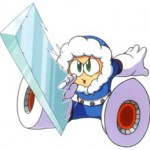
As Replacement Stage Music: It’s certainly repetitive enough to fit on the original Mega Man soundtrack.
Better Than Current Stage Music?: It’s longer, so, therefore, no.
Overall: Both Ice Man and Filthy McNasty would have a blast laughing their asses off over the fact that there are multiple meanings to the word “pussy.” For everyone else, this song is pretty annoying.

As Replacement Stage Music: It’s got a fun and bouncy beat that would actually mesh quite well with Top Man’s bizarre ferns-in-glass-casing stage, but it’d certainly give the experience a far less urgent feel.
Better Than Current Stage Music?: No. Top Man’s original music is among the best in a series that’s almost uniformly great. Sorry, Blur…ya can’t stop the Top.
Overall: Not really applicable to Top Man, so there’s little to enjoy about the coincidental title. “He’s a little boy racer” is about the only line that could even conceivably apply to him, and even then it’s not particularly evocative of the NES game. Blur should be ashamed of themselves.

As Replacement Stage Music: It’d work. Needle Man’s current theme is pretty weak as it is, with a strange kind of meandering salsa that never gets anywhere. This would give the stage some much needed energy.
Better Than Current Stage Music?: Without question.
Overall: We now know that the Needle Cannon Mega Man gets is firing dirty syringes…just to further complicate the “war for peace” morality of the series.

As Replacement Stage Music: It’s pretty perfect. Bowie knows better than any musician alive — barring, maybe, the members of The Flaming Lips — how best to paint majestic starfields with just some guitars or synths. It’d mesh quite well with the gameplay of that stage as is.
Better Than Current Stage Music?: Yes. Some people say that Star Man has the best music in Mega Man 5. Don’t trust those people; they are obviously liars or insane. (Charge Man bitches.) Whatever anyone might think, though, The Rise and Fall of Ziggy Stardust and the Spiders From Mars is a superior album to this Mega Man soundtrack. THERE I SAID IT.
Overall: Let all the children boogie.

As Replacement Stage Music: The song is atrocious, but…sure, why not. If we’re playing Mega Man 6 we deserve the punishment.
Better Than Current Stage Music?: Yes. It has notes and a melody, and is therefore superior to every track in this game.
Overall: A perfect fit. Speaking of “perfect fit,” Gary Young’s astroturf tuxedo in this video is the same one that Plant Man wore to his junior prom. When he went to his senior prom he didn’t have to wear anything…because he was somebody’s corsage! Fucking lol!

As Replacement Stage Music: I’d say it’s appropriate. The downtrodden, sluggish pace of the song absolutely mirrors the dark and rainy sections of Cloud Man’s stage, and…well…it’s just a pretty great song period. It’d stand in interesting contrast with the sunnier, brighter visual approach to Mega Man 7.
Better Than Current Stage Music?: Debatable. Overall I’d say it definitely nudges it out, but Cloud Man’s theme is already pretty great, and this kind of overt moodiness would probably feel out of place among the game’s other tracks, however refreshing the change in atmosphere (see what I did there?) might be.
Overall: This music’s sad and you should feel sad.

As Replacement Stage Music: Not at all. Jimi’s guitar is as fiery as ever, but Astro Man’s space- and technology-themed stages (he has two) would probably benefit more from some straight, swirling techno than screaming six-string theatricality.
Better Than Current Stage Music?: Yes. His current stage themes sound like rejects from a Jane Fonda workout video.
Overall: Astro Man sucks.

As Replacement Stage Music: Not really. It houses a great jam, but it wouldn’t at all fit Magic Man’s carnival approach to stage design. The passionate defense of the “Magic Man” in the song though would suit the game nicely, as it’s often derided along with Mega Man 8 as being well worth skipping.
Better Than Current Stage Music?: No question. Magic Man’s stage theme sounds like it’s lifted from an SNES Barney adventure.
Overall: Magic Man wishes someone would sing about him like this. Until then, he sits alone doing card tricks. And masturbating.
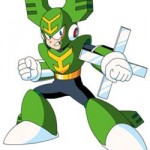
As Replacement Stage Music: Yes, yes, a thousand times yes. Absolutely perfect for the rainy, thundery, thousand-mile-high gauntlet of Tornado Man’s stage. Tornado Man’s level is a brutally addictive experience, much like this thrashing, gorgeously filthy nonsense.
Better Than Current Stage Music?: Nah, Tornado Man’s theme, like everybody’s theme in this glorious game, is utterly brilliant.
Overall: Would be a great fit…but Tornado Man’s already well served by his current tune.
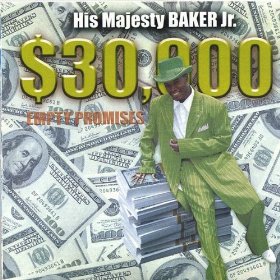

As Replacement Stage Music: I mean, what is he doing? What is this? No part of this cover makes sense to me. It’s a man with a big smile wearing a green pinstripe suit, a leprechaun hat, and leaning against a pile of money that’s far too large to be legal tender.
Better Than Current Stage Music?: And he’s doing this against a backdrop of more money, with the figure $30,000 indicated above. That’s a lot of money, in a way, but in another way, if you’re going to invent sums to make yourself seem rich wouldn’t you reach much higher than that? It doesn’t register as being particularly large…or small…it’s just somebody’s annual salary, and it’s nobody who could afford to be caught wearing a suit like that in public.
Overall: I don’t understand what I’m looking at. What is this? He has gold rings on every finger of his right hand. And how many points does his God damned handkerchief have? I hate this. I’m going to bed.
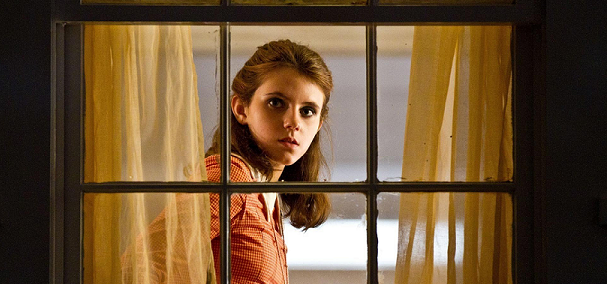
It’s finally happened…Denver has Moonrise Kingdom. And while I’m sure it will take me several more viewings to really formulate a thorough opinion, I can confidently say this much: it was worth waiting for.
The plot, as everybody knows by now, is that two lonesome youngsters named Sam and Suzy fall in love and take off together, as a massive storm brews and the small town becomes increasingly desperate to find them. Because I’d like to keep this review relatively spoiler free, I won’t say much more than that. I do say “relatively,” though, so if you’d like to remain totally unspoiled, stop reading now…and just know that, yes, it’s a film worth experiencing.
Moonrise Kingdom is a strange film…it both feels like a Wes Anderson film and yet stands pretty uniquely among them. Part of this might be due to the fact that he focused the film completely on a pair of unknowns — the first time he’s done that since Bottle Rocket — and sidelined the few regular collaborators that do appear. This movie very distinctly belongs to Sam and Suzy…and that does leave me with mixed emotions, though they are almost uniformly positive.
 The two young actors — Jared Gilman and Kara Hayward — are each fantastic finds. Gilman in particular does an excellent job of portraying Sam as a young man who’s not necessarily wise beyond his years, but certainly troubled beyond them. He’s guileless and without any sort of malice whatsoever…which is both why he becomes an easy target to his fellow scouts, and eventually earns their sympathy.
The two young actors — Jared Gilman and Kara Hayward — are each fantastic finds. Gilman in particular does an excellent job of portraying Sam as a young man who’s not necessarily wise beyond his years, but certainly troubled beyond them. He’s guileless and without any sort of malice whatsoever…which is both why he becomes an easy target to his fellow scouts, and eventually earns their sympathy.
Hayward’s work here is much more subtle — especially as her more manic moments all occur offscreen, thanks to some artful editing — but ultimately Suzy comes across as someone who alternates seamlessly and immediately between frightened and frightening.
Between them, the two leads do most of the emotional heavy lifting…though it’s almost as though Anderson doesn’t quite trust them to handle the load (more on that later). Regardless, Moonrise Kingdom contains its expected share of painful exchanges, revealing character not by what they say and do, but by what they fail to say and restrict themselves from doing.
One particularly intelligent choice on Anderson’s part was to provide us with information that each of these children, separately, is seen by others as being emotionally disturbed. The intelligent choice is to actually bear that out in how they act and react in their various adventures; this isn’t a case of adults failing to understand their children…this is a case of adults correctly assessing the fact that their children have problems, but not knowing how to handle them.
 Suzy, for example, is prone to violent outbursts. It’s completely at odds with her conservative dress and meticulously composed hair and makeup, but it’s always there in her eyes…a lurking, relentless darkness that prevents her from ever feeling at ease. One of Hayward’s best scenes in the film is one in which we can’t hear her…an outburst at her family in the middle of dinner. We catch her in mid eruption, and though we can’t hear a word she’s saying, that’s not important. What’s important is that she can’t contain her anger — which may or may not even have definition — and also that her family sits quietly, absorbing it, not reacting. They don’t know how to handle their daughter…and therefore cannot help her.
Suzy, for example, is prone to violent outbursts. It’s completely at odds with her conservative dress and meticulously composed hair and makeup, but it’s always there in her eyes…a lurking, relentless darkness that prevents her from ever feeling at ease. One of Hayward’s best scenes in the film is one in which we can’t hear her…an outburst at her family in the middle of dinner. We catch her in mid eruption, and though we can’t hear a word she’s saying, that’s not important. What’s important is that she can’t contain her anger — which may or may not even have definition — and also that her family sits quietly, absorbing it, not reacting. They don’t know how to handle their daughter…and therefore cannot help her.
Sam’s issues are rooted a little more deeply, and are therefore that much more obscured. He is an orphan who has not recovered from the deaths of his parents, and he wears his mother’s brooch like an exposed scar. At one point he confesses to having committed arson while sleepwalking…and he got in trouble for it because nobody believed he was actually asleep. What neither Sam nor Suzy understands is that it doesn’t matter whether or not he was asleep…either way, he needs help that is not being offered to him.
 But the two understand each other, and the two accept each other, and those are things that neither has ever really felt they’ve had before. They each come burdened with baggage, but they’re not judgmental of each other. In fact, Sam takes great pains to transport all of Suzy’s overloaded luggage along with them, regardless of the trouble it causes him to do so. In a clever inversion of the moral of The Darjeeling Limited, which requires each of the brothers to leave their accumulated baggage behind, Sam embraces Suzy’s, understands that that’s who she is, and is always careful to let her know that he’s comfortable with that.
But the two understand each other, and the two accept each other, and those are things that neither has ever really felt they’ve had before. They each come burdened with baggage, but they’re not judgmental of each other. In fact, Sam takes great pains to transport all of Suzy’s overloaded luggage along with them, regardless of the trouble it causes him to do so. In a clever inversion of the moral of The Darjeeling Limited, which requires each of the brothers to leave their accumulated baggage behind, Sam embraces Suzy’s, understands that that’s who she is, and is always careful to let her know that he’s comfortable with that.
Of course, the two are each living in a fantasy of their own devising. Why this works, however, and why we root for them, is that these fantasies are compatible. Suzy wishes to be swept away, and Sam wishes to sweep away. It gets them each where they think they need to be, and it’s a seductive combination. As short-sighted as their plan really is (tellingly, Suzy only borrows her brother’s record player for 10 days), we want this for them. After all…what else do they have?
One line that many reviewers seem to latch onto as a pretty clear distillation of the film is what Sam says to Suzy when she tells him she’s envious of the fact that his parents are dead. “I love you,” he says, “but you don’t know what you’re talking about.”
Personally, I think the defining moment came for me when, early in the film, Suzy asks about a recently deceased dog that Sam used to know. “Was he a good dog?” she asks. Sam, more sagely than he realizes, replies, “Who’s to say?”
 It’s a very Anderson-like response, tapping into very Anderson-like themes. Who is to say? We all view ourselves in some way, but, if that’s not what the world sees, then what does it matter? Who are we? Are we the people we try to be? Or are we the people everyone else believes us to be? What are we? What defines our identities? Or, to phrase it in the parlance of this film, what kinds of birds are we?
It’s a very Anderson-like response, tapping into very Anderson-like themes. Who is to say? We all view ourselves in some way, but, if that’s not what the world sees, then what does it matter? Who are we? Are we the people we try to be? Or are we the people everyone else believes us to be? What are we? What defines our identities? Or, to phrase it in the parlance of this film, what kinds of birds are we?
Moonrise Kingdom catches the protagonists at a pivotal point in their lives, during which the promise of a magical future has yet to die and become the lingering echo that haunts the Tenenbaum family, or Team Zissou. For Sam and Suzy, whatever the future may actually turn out to hold, there is still time.
For the other characters in the film, there’s less time. The major adult characters are resigned to their roles, to their failings, and to their fates. Bill Murray’s character expresses exactly one wish in the film, and that’s for the storm to pull the roof from his house and suck him into space, because his family would be better off without him. It’s a fantastic line perfectly delivered, and it conveys a concentrated lifetime’s worth of disappointment.
There’s more I could say about this film. Maybe, eventually, I will. But, for now, I’ll move on to the very small complaints I think I have after one viewing, which will likely be totally erased after another few, if history is any example.
For starters, this is absolutely Anderson’s most overtly comic film. Jokes and sight gags are packed into these scenes, and they often dominate. It’s not a bad approach, but it’s certainly somewhat jarring for Anderson to be chasing the more obvious laughs, and I almost wonder if it’s because he didn’t trust his young leads to handle the emotion on their own. By undercutting himself and giving the audience a chance to relax into a more comfortable form of humor, he is lightening the loads that his protagonists actually have to carry. It’s a noticeably unrestrained variation on his typical approach, and while I don’t think it hurt the impact of the film, it did seem to make it feel unfocused at times.
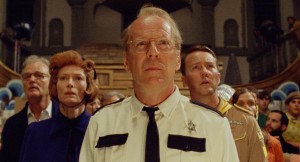 Also, I’m not entirely sure that any characters outside of Sam and Suzy experienced any clear growth. The film suggests that they did, or at least that some of them did, but it would have been nice to spend more time with them along the way, and perhaps come to understand precisely how they’ve changed, and exactly why that’s important. Then again, as my girlfriend correctly put it, Anderson isn’t one to dwell on information he doesn’t think we need, and we, as members of the audience, should be meeting him at least halfway. For now, however, after one viewing, I feel as though Captain Sharp and Scoutmaster Ward had their most impressive moments when the cameras weren’t on them.
Also, I’m not entirely sure that any characters outside of Sam and Suzy experienced any clear growth. The film suggests that they did, or at least that some of them did, but it would have been nice to spend more time with them along the way, and perhaps come to understand precisely how they’ve changed, and exactly why that’s important. Then again, as my girlfriend correctly put it, Anderson isn’t one to dwell on information he doesn’t think we need, and we, as members of the audience, should be meeting him at least halfway. For now, however, after one viewing, I feel as though Captain Sharp and Scoutmaster Ward had their most impressive moments when the cameras weren’t on them.
Overall, though, I loved it. At the end of the film I wasn’t sure what I thought, but by the time the credits ended I was already cycling through dozens of conflicting emotions, and I still am right now, as I write this. Moonrise Kingdom left a mark. I don’t know what that mark is, just as none of the other children understood their compulsion to listen to Suzy read from her stolen library books. It’s a story, and it means something to them. They might not know what. They don’t mind. The experience of feeling it unfold is the reward.
Moonrise Kingdom unfolds in enormously satisfying ways. And it’s okay if you feel a little bit confused…young love has that effect on people.
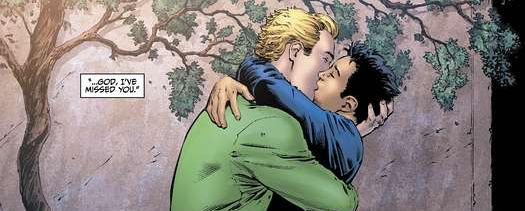
…or perhaps that should be Why it Matters to Me That Green Lantern “is Gay.”
Without any question, you’ve heard about this already. Green Lantern is gay. That “is” is a present tense verb there, folks, and that’s why I have something to say about this. It is a fact that Green Lantern is gay. It is not a fact that he was gay, or always has been gay. And that’s a problem, because as progressive as this narrative decision might intend to be, it’s actually quite reductive, ignorant, and insulting.
The problem isn’t that there’s a major gay superhero now, no matter what the Parents Against Whateverthefuck groups would have you believe…in fact, they should be cheering this decision, because it makes it seem as though homosexuality is something that people can add and remove from their lives like an accessory or a piece of clothing…something to be picked up and worn when it suits them, and not at all until then.
That’s just downright wrong, not to mention preposterous. Homosexuality is not like facial hair…you don’t grow it out because you’re going through a phase or because you decided you’d look better that way. It’s an integral part of who people are…it’s what makes them human…and it’s always been there. It’s not a choice, any more than skin color, height, or voice is a choice. It’s part of who you are from birth, and while it might take a while for somebody to realize — or understand, or accept — that they are gay, that’s a gradual process of internal discovery…not an external feature plugged into us wholesale by some cosmic decider.
This reminds me in many ways of the hubbub over J.K. Rowling “revealing” that Dumbledore was gay, however many years ago that was. My concern then was similar, but it was overridden by my disgust for what she did to writing more than what she did to homosexuals.
In that case, it was a clear authorial trespass. As the author of her books, she was able to reveal anything she liked at any point. Until — and this is important — she finished writing them. After that, it’s hands off. She doesn’t get to reveal additional data elsewhere that isn’t sustained within the novels. I’ll admit openly that I haven’t read them…but I’ve known many people who have, and they’ve shared the same concern: there doesn’t seem to be anything in the novels that sustains such a reading. Certainly one could make it fit, just as we could make fit anything we’d like to imagine while we’re reading a book, chalking it up to it being one of the hundreds of trillions of things an author doesn’t tell us along the way but which we would like to believe is true anyway, but this isn’t a case of imagination…this is a case of after the fact authorial insistence.
Whatever else it may be, that’s bad writing. Either Dumbledore was gay all along and Rowling didn’t know how to handle that as an author and so she just stored it away for later blurting at a press conference, or he wasn’t gay until the moment she said he was, at which point she demonstrated an enormous disrespect to the world she created, and the imaginations of her readers that have taken them in other directions. Readers are supposed to meet books halfway…whatever they get out of it, whatever they hear, wherever their magical journey takes them, then that’s what they get from the experience. Rowling of all people should have known better about magical journeys. The author doesn’t get to inject details via syringe long after the fact.
In this case, though, it’s a comic book. Comic books have multiple authors, they span multiple generations, and there’s not just one author. What one might use as the groundwork for his character might be manipulated, discarded, or inverted by his successor. We can argue about the merits of that as well, but, for now, it’s a fact we have to take as read.
The problem, though, is that it’s still the same character. It’s a character that’s had a wealth of experiences and left an enormous imprint on his fans…fans who know every detail about what he’s actually said, done, and accomplished.
And now he’s gay. Just like that.
He wasn’t gay in the background. He wasn’t coming to grips with his sexuality for years. And he wasn’t just waiting for the perfect moment to reveal to those who care about him that he harbors a secret. He was just one thing yesterday, and another today. He donned his homosexuality like a wristwatch. Maybe he’ll like this wristwatch, or maybe he’ll take it off again once everybody gets annoyed by its loud ticking.
That’s unfair. That’s not how homosexuality works…scratch that. That’s not how humanity works. That’s not how people work.
It’s not a decision, it’s not an immediate restructuring. This is something people learn over the course of a lifetime. For Green Lantern and Dumbledore, apparently, they just become gay because someone said so. That’s terrible writing, and even worse humanity.
Regarding this radical change in which one person we’ve been learning about for so many years is killed off and replaced by a person similar in all ways but also gay, writer James Robinson said this: “It’s a realistic depiction of society. You have to move with the times.”
You’re not moving with the times at all. You’re reducing homosexuality to a character trait that can be picked up or discarded at will…that’s emphatically behind the times. That’s the mentality that keeps gays from marrying, or being recognized as functional human beings. If someone can just snap into gayness, well, just don’t snap that way and you can marry and be respected and do all the things us normal folks so love to do. That’s wrong, Robinson.
That’s wrong.
Think of it as though this weren’t a question of sexuality. Think of it as though this were a question of race. Batman, in an issue to debut next month, is revealed to be black.
Not a new Batman. Not somebody else who becomes Batman because Bruce Wayne dies. But the Batman we know. The same guy. The dead parents, the wise butler, the wonderful toys. The one we’ve seen in countless movies and comics and on television.
He’s black. And he always was. That’s the grand reveal.
Could that possibly make any sense whatsoever? It’d be absurd. It wouldn’t get people up in arms about reductivism, because it’d so clearly be impossible.
That’s what we’re dealing with now. Only the impossibility is being ignored. Not debated…just ignored.
I can’t think of a worse way to treat homosexuals than by demeaning the fact that their sexuality has shaped them, affected their lives, and helped them grow into the individuals they are today.
Green Lantern is gay, Batman is black, Wonder Woman actually contains a misplaced space and she’s really Wonderwo Man, and Poochie died on the way back to his home planet.
“It makes sense because we said it makes sense. It goes this way because we say it goes this way.” I don’t know about you, but I can’t think of anything worse than that to say to a homosexual man, woman, or child today.